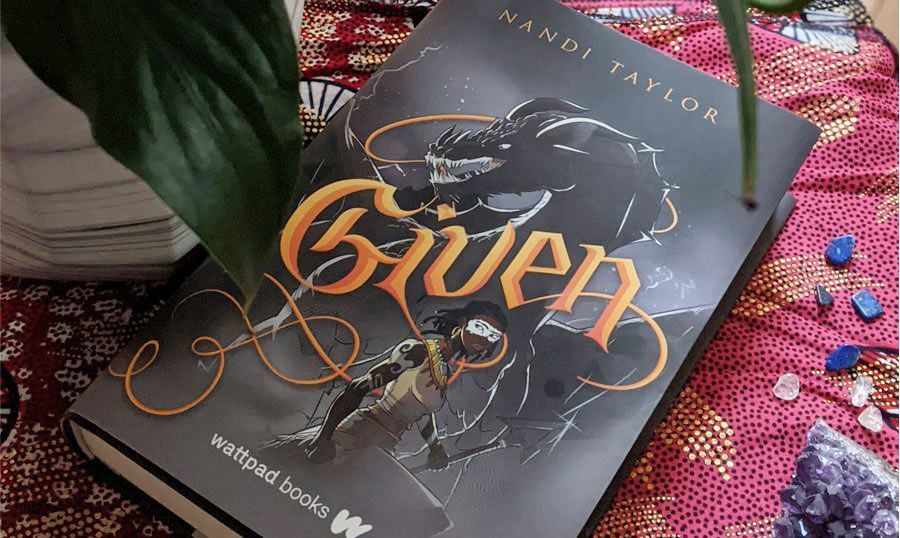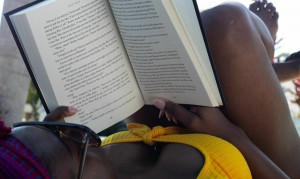Within time, this intriguing young-adult fantasy garnered over 1.2 million reads and won the Watty award for worldbuilding. As a result, it was selected as part of the first round of books to be published as a hardcover by the newly-formed publishing arm, Wattpad Books. Since then Given has received a starred review from ALA’s Booklist magazine and appeared on Entertainment Weekly’s Top 20 Books of January 2020.
The story begins with a young princess, Yenni Aja-Nifemi ka Yirba, leaving her home in the Sha Islands to travel to the Empire of Cresh in search of a cure for the illness that afflicts her father. The sacred journey Yenni embarks on takes the name Orire N’jem and is a yearlong quest. During times of tribulation, royal members will venture afar to help their tribes and to win the favour of the Sha—which are the gods and divine protectors of the people reminiscent of Yoruba Orishas. With fierce determination blazing in her heart and painted white runes swirling across her dark skin like ribbons, Yenni boards a ship towards Prevan Academy to gain an understanding of Creshen magical arts. Her journey and her experiences of othering once she starts to acclimate to Creshen society is a speculative rendition of a tale that many immigrants know well. It is the excursion to “foreign” in search of something that seems to be lacking back home. Within this new landscape, Yenni finds that she must rediscover ways in which to affirm her intellect, her value and her worth.
During Yenni's first day at Prevan Academy, she encounters a shape-shifting dragon by the name of Weysh Nolan. Weysh is a hulking wall of a man who is Creshen and Islander, and though well-meaning, is an impulsive oaf. He adamantly proclaims that the bold warrior princess before him is his Given—otherwise known as his bonded mate. The reader witnesses several attempts of Weysh trying cloak his arrogant approach to courtship as a display of roguish charm that should endear Yenni to him, but instead leaves a sour taste in her mouth. It is not until he tones down the masculine bravado and starts to be more sensitive about Yenni’s purpose for coming to Cresh that he is able to gain some headway.
Nandi Taylor brilliantly envelops readers into a world of runelore, a source of magic derived from painting runes on a person's skin and sealing them by singing a wordless hymn. These runes function like special abilities, enhancing strength, speed, focus, etc. once pulled on. Given skillfully uses the aspects of runelore to stimulate a conversation about what type of knowledge is labelled superior, the affect that colonization had on spiritual practices outside of what the empire deemed acceptable, and about cultural respect. We live in a time where being exposed to other cultures is as simple as a few mouse clicks or a scroll through an Instagram home feed. Yenni’s interactions with Professor Devon, a young scholar teaching basic runelore at Prevan Academy, encourages readers to contemplate the age-old question: when does cultural appreciation turn into appropriation? In the case of Professor Devon, the answer to this question is a little more obvious. When chastised by Yenni for his use of a pilfered rune sacred to the royal family of the Watatzi tribe, Professor Devon retorts: “Knowledge cannot be stolen, Yenni Ajani. It should be available to all.” This assertion masquerades as an objective claim that there should be no boundaries placed on the pursuit of knowledge because it contributes to societal advancement. What Professor Devon’s statement lacks is an informed understanding of power relationships and respect for the traditions that deeply inform the spiritual makeup of other ethnic communities. Not to mention, who benefits here? What does the Watatzi tribe gain from the Creshens knowing their secret runes—the answer is absolutely nothing.
Most of the narrative in Given takes place in Cresh, which creates a space for interesting social commentary; however, I found myself wanting to know more about the Yirba people. I wanted to go back to the Sha Islands and meet with Yenni’s twin sisters once more to hear their jovial teasing and jangle of their gold bracelets. I wanted to learn more about the Watatzi tribe that managed to evade colonial conquest due to their magical prowess. Aside from that criticism, the novel has a tidy ending with a nod to a future adventure that will take place at the home of the ka Yirba.
Yenni, though sometimes a little irksome and headstrong, is a female protagonist that I found relatable. At times I wished that I had her tenacious quality to confidently advocate for herself and challenge those who mistreat the traditions of her people. An easy and enjoyable read, Given is a novel that you come back to so that you can marvel at the descriptions of the runes and the effort placed into constructing the foundational stories of the Sha Islands.

 By
By 








